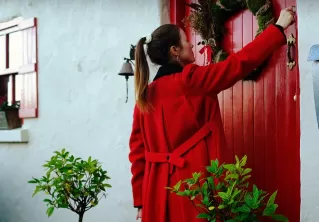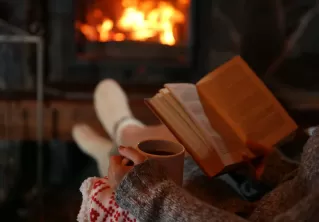Sustainable & Slow Homemaking Habits I'll be keeping in 2021
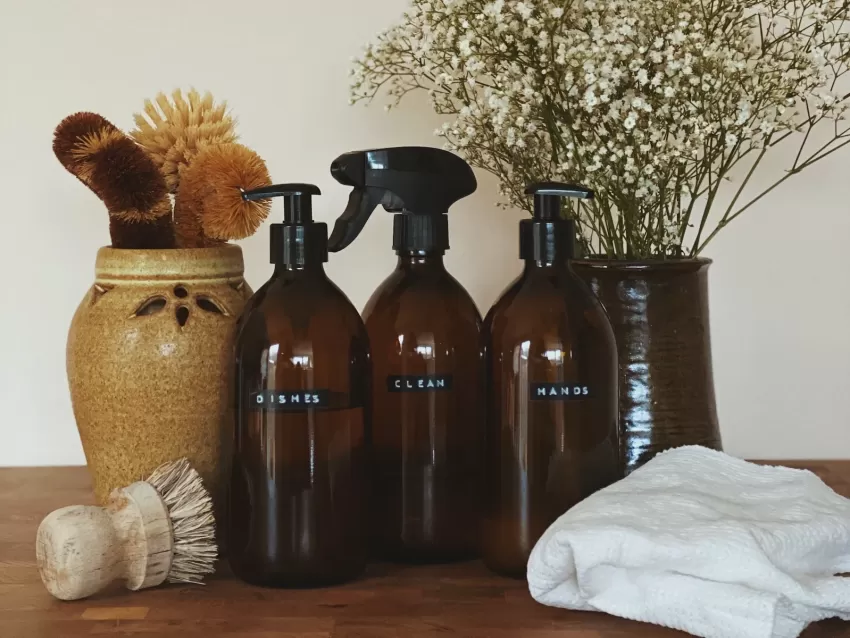
Dearest friends, well the year 2020 was an interesting one, wasn’t it? Funny how life can throw us a curveball that could knock us all for six - yet what might have seemed like a terrible year on the surface has had its blessings too.
Now is perhaps a time to reflect on the opportunities and mindset shifts that this year in lockdown has brought about…
I distinctly remember a news report in Summer that highlighted the amazing ways nature was restoring its health and claiming back parts of the earth during lockdown. The polluted canals of Venice were once again clear, air quality improved in major cities across the globe, smog dissipated, and wild animals once again roamed the streets in urban areas. It’s fascinating how the Earth has a propensity to heal itself in these ways, if only we’d give it a chance!
You can probably tell from my recent posts that slow living, sustainability, and the role that I can play as a housewife to positively impact our environment has been on my mind a lot lately. Perhaps staying home (even more so than usual) gives you an acute awareness of not only the things that you bring into your home, but the things that you throw ‘away’ too.
So as we bid farewell to this annus horribilis, I’d like to share with you some sustainable and eco-friendly homemaking options I have adopted of late, that will definitely remain with the Darling Household in the coming year.
This year has proven to me without a shadow of a doubt that when you do good, you feel good, and families and households certainly need more of that feeling right now! We may feel powerless in many ways, but we honestly have the ability to change so much for the better! It’s all in the little things…
Sustainable Family Food: Grow your own, and support local farmers.
I have been a bit of a hobby vegetable gardener for around five or so years now, and there is nothing more satisfying than pulling homegrown leeks and carrots from the plot, digging up potatoes, and sending your little one to the strawberry patch to pick some fruit for breakfast or a delicious pudding. I like to garden organically, and that means using alternative methods such as ladybird predation to help with an aphid issue, and installing bug houses to help with pollination. The Green Gardener is a great resource for advice and products for growing organically and “as nature intended”.
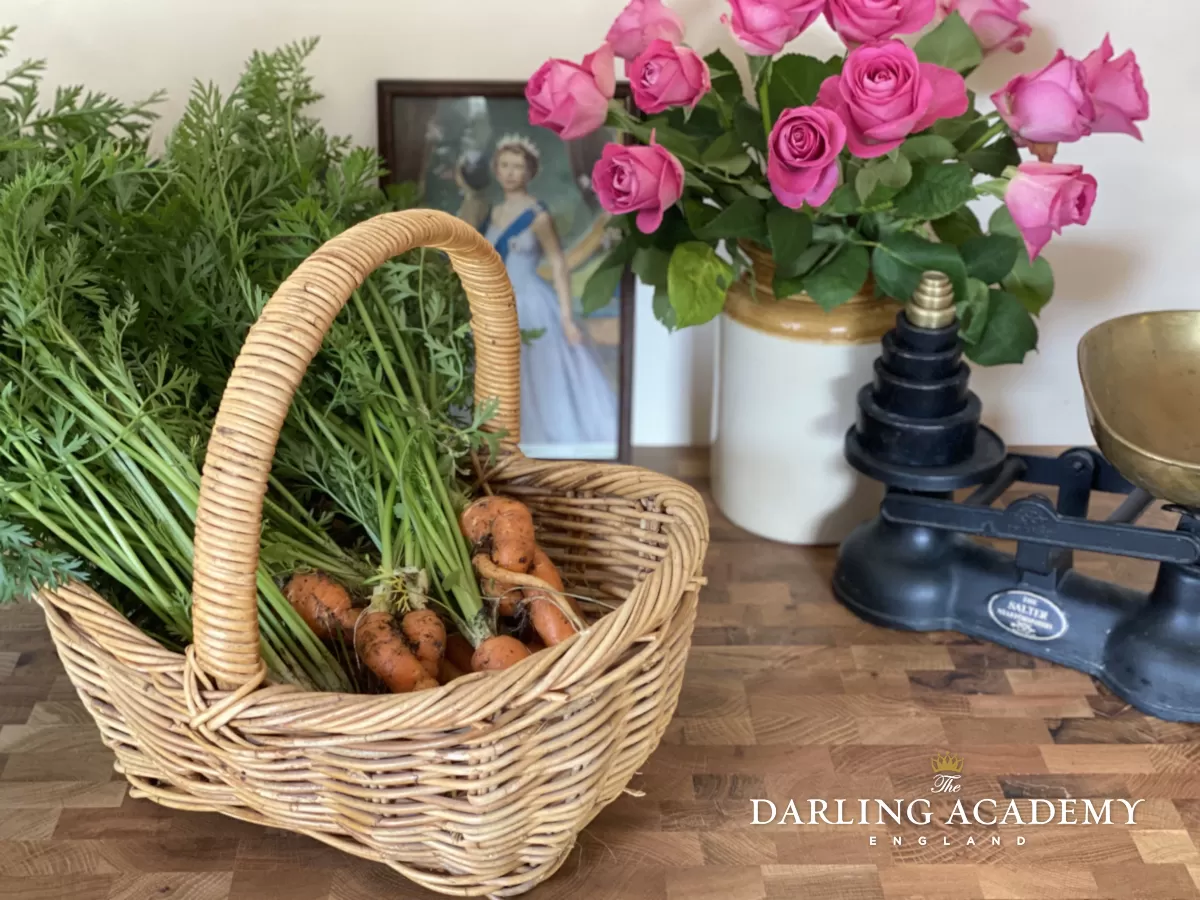
What I cannot grow myself due to space, climate, or know-how restrictions, I get from Riverford. Every week they send us a couple of boxes full of delicious, organically grown fruit and vegetables - they let me know about a week in advance what we shall be getting, and I plan our weekly menu around that. It saves on waste, we eat seasonally (which is incredibly sustainable, not to mention healthy), most of the vegetables come loose, and those that are packaged come in containers or bags that can be composted or recycled. Any “extras” I need are purchased from my local farm shops, using produce bags sewn by myself from cotton IKEA tea towels.
 Our eggs are also delivered to our doorstep on a Monday morning from a local free-range farmer. Money goes directly into his pocket rather than being squeezed for profit by the shops. We also hand back the cardboard cartons on a weekly basis so that they can be reused rather than recycled.
Our eggs are also delivered to our doorstep on a Monday morning from a local free-range farmer. Money goes directly into his pocket rather than being squeezed for profit by the shops. We also hand back the cardboard cartons on a weekly basis so that they can be reused rather than recycled.
Another way to help support your local farming and agrarian economy as well as cutting down on plastic waste, is to get in touch with your local milkman! Personally I like to support the first-hand farmer rather than the middle-man where possible so cannot recommend local services, but do search for dairy farmers in your local area! Ask if they provide glass bottles which is the best option for a circular economy.
I am yet to make the leap to purchasing our meat directly from a butcher, so this is a new year resolution I am setting for myself!
Sustainable Kitchen & Cleaning Products
Following on from food, the next area of homemaking that has a significant impact on the environment is how you operate your kitchen. Getting to grips with your recycling is a good first step, but don’t forget to take a good hard look at your cleaning consumables and what you are using there that you are throwing away regularly.
We have switched to glass food containers, great ones can be found at IKEA, and I also love to make my cleaning a little greener with glass bottles from Kuishi (so gorgeous) for refill hand and dish soap, or making my own cleaning products from fruit scraps and white vinegar.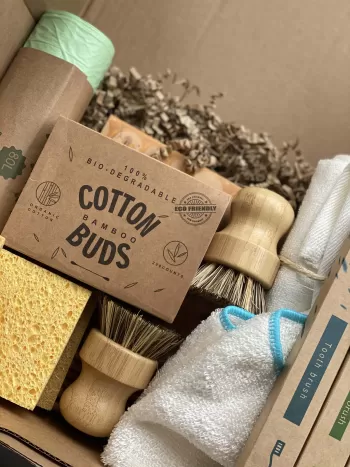 Natural bristle cleaning brushes, beeswax wraps (to replace cling/plastic wrap), silicone baking liners, bamboo straws, and washable bamboo cloths in place of paper products are great options. You can even sign up to subscription programs such as those from Yes Crate who will send you replacements every three months. I know these things are a little harder to source than the options currently available on the supermarket shelves, and so a plastic-free option such as this is fantastic.
Natural bristle cleaning brushes, beeswax wraps (to replace cling/plastic wrap), silicone baking liners, bamboo straws, and washable bamboo cloths in place of paper products are great options. You can even sign up to subscription programs such as those from Yes Crate who will send you replacements every three months. I know these things are a little harder to source than the options currently available on the supermarket shelves, and so a plastic-free option such as this is fantastic.
Most British families also have their washing machines in the kitchen, so this is another area to consider. We recently switched to a company called smol who deliver laundry products, and dishwasher tablets by post in letterbox sized boxes. The difference in “storage bulk” is astounding.
£4.50)
Kitchen Management Manual
Printable PDF housekeeping handbook
- Meal Planner
- Shopping List
- Recipe Card
- Pantry & Freezer Guides
- Seasonal Food Guides
- Conversion Charts
- FREE BONUS Laundry Tips!
Not only that, they are completely plastic and harsh-chemical free! I highly recommend them, not least because you can set the terms of how often, and how much they deliver, but the price is comparable with mainstream brands. Oh and yes, they work just as well, and the scent is just as lovely as anything else. They also don’t leave animal fat on your clothes like other brands do. Yep gross - I didn’t know either!
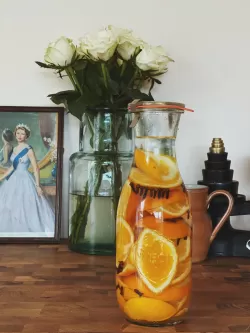 We have also significantly reduced our use of chemicals, instead leaning towards natural alternatives for common household products. Surface cleaner can be made from white vinegar and fruit peels, and any herbs from the pantry or garden, and plant food made from calcium-rich eggshells!
We have also significantly reduced our use of chemicals, instead leaning towards natural alternatives for common household products. Surface cleaner can be made from white vinegar and fruit peels, and any herbs from the pantry or garden, and plant food made from calcium-rich eggshells!
We have also been foraging to make our own jams, chutneys, marmalades, and cordials without all the extra stabilisers, preservatives, and nasties that commercial brands pour into their products. Natural is always better when it comes to homemaking, housekeeping, and home cooking.
Sustainable Bathrooms & Beauty Cabinets
One of the very best switches I made this year was purchasing a set of reusable bamboo make up remover pads. These are incredibly easy to wash, which negates the need to constantly repurchase. I just throw mine in with the towel wash within the bag supplied and they come out like new! After time, they may discolour if you use a lot of mascara and eyeliner like I do, but that has no bearing on their effectiveness.
A long time switch has been reusable sanitary towels too, I know not everyone likes the idea of these but oh my, they feel like heaven compared to disposable products! I make sure to rinse them out and keep them wet in a dedicated plastic bin until I can launder them. Keeping them damp ensures they don’t stain, and if you’ve had a baby you’ll realise that this is “nothing” in the ick-factor. Bodily functions are natural, and nothing to be ashamed of - or thrown “away” never to decompose (one pad takes 500-800 years to begin to break down). Think on that.
As for other personal care consumables, after trying so many different brands and methods, I realise I am not a fan of natural and bar shampoo so the L’Oreal Dream Lengths will be staying for a while (I wish they offered it in 5L bottles, but at least the smaller bottles are made from recycled plastic, and can be recycled further). However, we have switched to cardboard packaged bar soap for hand, face, and body washing, as well as using bamboo cotton buds (QTips) when required. We have a safety razor (best thing ever), and I use a bamboo toothbrush, but the boys of the house aren’t thus convinced (it’s a sensation thing).
The item most frequently replaced in the bathroom is indeed toilet paper. Die-hard zero wasters will use cloth (and launder it), but I’m not sure that’s the life for me. Instead we purchase (and have also kindly been gifted) boxes of bamboo toilet paper by post from companies such as White & Green.
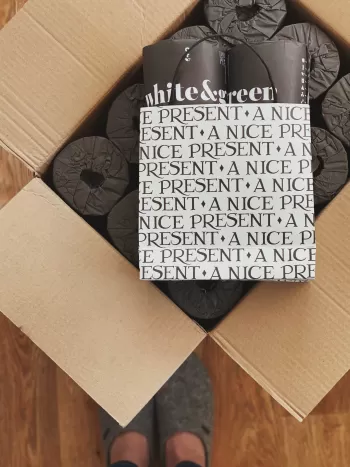 They do a lot of good in that they manufacture their toilet paper from bamboo which is the fastest growing plant on earth, requires much less water to grow, and takes in more Co2 than trees! The whole package comes completely plastic-free and for every box you buy, they supply someone with clean drinking water for a year.
They do a lot of good in that they manufacture their toilet paper from bamboo which is the fastest growing plant on earth, requires much less water to grow, and takes in more Co2 than trees! The whole package comes completely plastic-free and for every box you buy, they supply someone with clean drinking water for a year.
I don’t know about you, but I also happen to think the packaging looks rather chic! They look great on display. I also think a box or subscription would make a great first-home/moving in gift for a friend or loved one too. A little off the wall perhaps, but utterly useful! No more toilet paper pandemic panic buying!
Living a sustainable and slow family lifestyle
I’ve found that trying to live sustainably has given us all a new focus, and keeps us mindful of our connection with the earth. When you’re surrounded by the same four walls, it’s nice to know that your space is a calm & kind place, and the people within it are trying their best to tread lightly on the earth. All these endeavours save us money too!
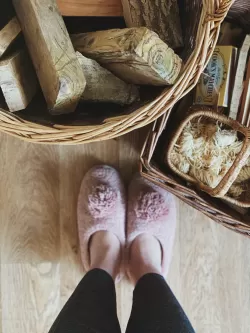 Other easy ways in which we are making changes as a family are taking more nature walks (on which we take a black sack and litter-pick along the way), foraging from nature when and where we can (for seasonal decorations, as well as food), and we like to trade things with our neighbours.
Other easy ways in which we are making changes as a family are taking more nature walks (on which we take a black sack and litter-pick along the way), foraging from nature when and where we can (for seasonal decorations, as well as food), and we like to trade things with our neighbours.
Quite often firewood otherwise destined for the scrap heap is exchanged for baked goods between my neighbour and I, and we source most things for the home and our entertainment such as books, home school items, electronics, and board games secondhand! Do not worry if you don’t have the “latest” XYZ. Life is worth so much more than material possessions!
“Therefore I tell you, do not worry about your life, what you will eat or drink; or about your body, what you will wear. Is not life more than food, and the body more than clothes? Look at the birds of the air; they do not sow or reap or store away in barns, and yet your heavenly Father feeds them. Are you not much more valuable than they? Can any one of you by worrying add a single hour to your life? Matthew 6:25-27 NIV
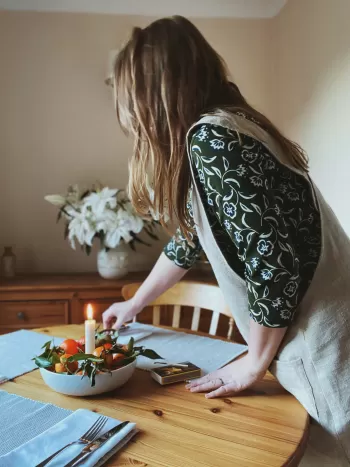 As keepers of the home, those in the #ApronCladArmy are more influential than they realise. Most of us are doing our absolute best to raise a fine generation of young people, and leading by example to take care of the earth and each other is the most impactful way to go about it.
As keepers of the home, those in the #ApronCladArmy are more influential than they realise. Most of us are doing our absolute best to raise a fine generation of young people, and leading by example to take care of the earth and each other is the most impactful way to go about it.
There are still so many ways in which I can personally improve upon my homemaking and making it as kind to the environment as possible, but I know for sure that doing things the “old ways”, and not necessarily the most convenient way, is almost always a guaranteed win. I also know that Rome wasn’t built in a day. Little changes here and there are what matters.
Perhaps 2020 was the year that taught us all that less is more, slow is better, and that family is everything? I know in my heart that this lesson is one to embrace.![]()
Tips for running a sustainable, slow, and peaceful home:
- Slow down, in every area of your life. It’s nigh on impossible to live sustainably and mindfully in the fast lane!
- Make “trends”, and caring about keeping up with the Jones’ exit stage left… realise your lifestyle, your home, and your way of doing things does not need to mirror popular culture. There really is more joy to be found when living with less!
- Borrow where you can, and buy secondhand. When you do buy new, buy to last.
- Wear it out! That includes your clothes, breaking up with fast fashion and “trends” is a great way to save money too.
- Change your own habits before trying to change someone else’s - are you practicing what you preach?
- Keep an open narrative with your children about WHY you recycle/buy secondhand/cook from scratch etc. They’ll have a deeper understanding of the better choices, and begin to make them for themselves without supervision.
- Watch nature and environmental documentaries together. There’s nothing like an eye-opening show (and perhaps a tearful one) to provide the motivation to do better.
- Research the most sustainable *anything* before you buy. From eggs, to envelopes, to electricity suppliers.
- Ask yourself: do you really need it? Every purchasing decision should be prefaced with this query. This’ll help save the planet, and your pennies.
- Give yourself grace, sometimes we just can’t afford the most sustainable/eco option, but continue to make those little changes where you can.
Life, and happy homemaking is a journey that requires consistency, just keep taking those positive steps forward!
Thousands of housewives making smaller changes, have a greater impact on the planet than one household doing it “perfectly”. There is no such thing as perfection, only progress.
Suggested reading: Zero Waste Home, Walking Gently on the Earth, Minimal: How to Simplify Your Life & Live Sustainably, Bringing it to the table: on Farming & Food, Braiding Sweetgrass, The Sustainable-ish Living Guide.
£4.50)
Kitchen Management Manual
Printable PDF housekeeping handbook
- Meal Planner
- Shopping List
- Recipe Card
- Pantry & Freezer Guides
- Seasonal Food Guides
- Conversion Charts
- FREE BONUS Laundry Tips!
Season's Greetings!
This has been both a quiet and a chaotic year in equal measure. I’d like to send you season’s greetings from my family to yours.
I would also like to extend a heartfelt thank you to every housewife, husband, journalist, and traditionally-minded individual who has contacted me, commented, and encouraged me in this endeavour to have the pursuit of homemaking, and the work of housewives better respected, and fairly represented in the media. I couldn’t have done it without you! A good work has surely begun, and your support means the world to me.
I shall see you in the new year, with articles for not only embracing a year of beautiful homemaking simplicity, and family values, but to share the journey of learning to live on earth as it is in heaven.
With love, festive wishes, and happy homemaking!
Alena xxx
If you like our values and found this post useful or inspiring, would you kindly consider supporting the blog and buying the author a one-off cup of tea?
All content and images in this article are copyright of The Darling Academy and are not to be shared or reproduced without our express permission. Affiliate links have been used in this post. There is no extra cost to you, but I may earn a small commission on your purchase.

